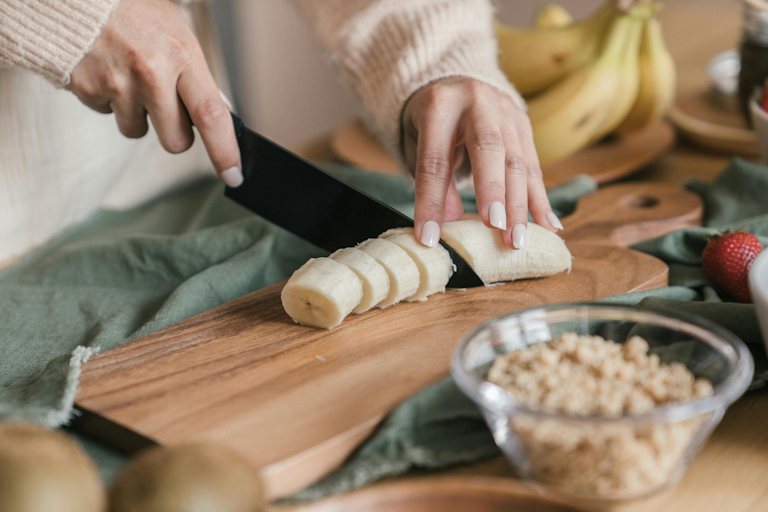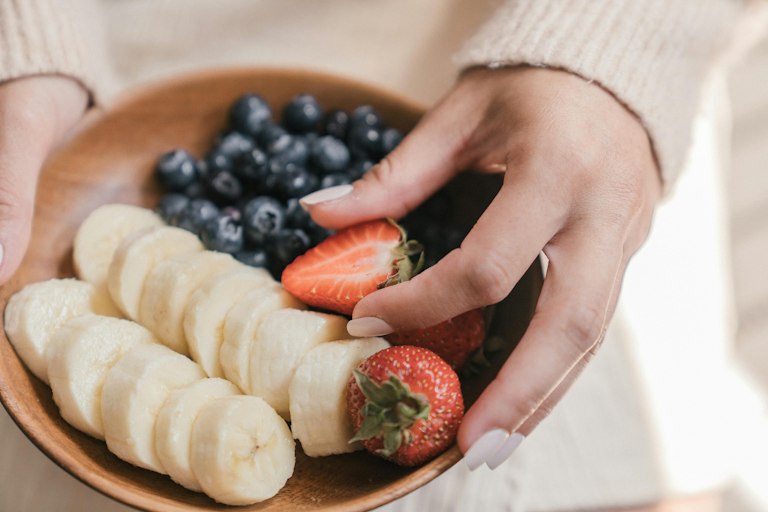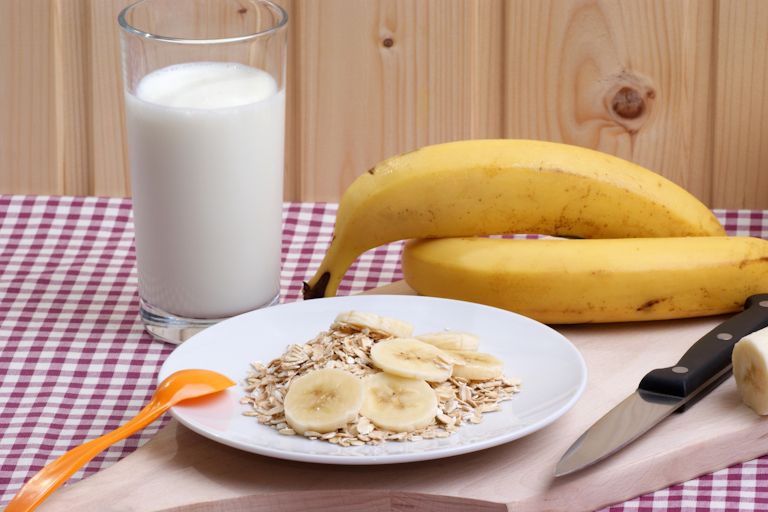
Bananas are a globally popular fruit, appreciated for their convenience, sweet taste and impressive nutritional profile. However, there is often confusion when it comes to the timing of banana consumption, specifically whether eating bananas before bedtime is beneficial or potentially harmful. While some claim that eating bananas at night could disrupt digestion or contribute to weight gain, others highlight their potential benefits, such as aiding sleep and providing a light, satisfying snack.
This article takes an in-depth look at the scientific evidence, nutritional facts, and practical considerations to help you make an informed decision about adding bananas to your evening routine.
Why Bananas They’re a Dietary Staple
To understand whether bananas are appropriate for evening consumption, it’s important to examine their nutritional composition. Bananas are rich in:
1. Potassium: A medium banana contains about 9% of the Recommended Daily Intake (RDI) of potassium, a mineral essential for heart health, muscle function, and maintaining electrolyte balance.
2. Carbohydrates: Bananas are a natural source of carbohydrates, primarily in the form of sugars and starches. This makes them an excellent source of energy, especially for physically active individuals.
3. Dietary Fiber: With about 3 grams of fiber per medium banana, they support digestive health, promote satiety, and help regulate blood sugar levels.
4. Vitamins: Bananas provide vitamin C for immune support and vitamin B6, which aids in brain function and neurotransmitter synthesis.
5. Magnesium: This mineral supports muscle relaxation and helps improve sleep quality.
6. Tryptophan: A precursor to serotonin and melatonin, tryptophan in bananas may promote mood regulation and restful sleep.
3 myths and misconceptions about banana consumption before bedtime

1. Bananas cause weight gain when eaten at night.
Many people believe that eating carbohydrates at night leads to weight gain. This belief stems from the idea that the body’s metabolism slows down at night. However, scientific evidence suggests that weight gain is determined by total caloric intake and expenditure over time, not the timing of specific foods. A medium banana contains about 100 calories, making it a moderate snack that is unlikely to derail your weight loss goals.
2. Bananas are hard to digest at night.
Bananas are typically easy to digest due to their natural enzymes and fiber content. While some people with sensitive stomachs may experience mild bloating from overripe bananas, this is not a universal problem. In fact, the soluble fiber in bananas can aid digestion by softening stools and promoting regularity.
3. Eating bananas interferes with sleep.
The concern here revolves around their sugar content. However, the natural sugars in bananas are balanced by fiber, which leads to a gradual release of glucose into the bloodstream. In addition, the magnesium and tryptophan they contain may actually improve sleep quality by promoting muscle relaxation and the production of sleep-regulating hormones.
Benefits of eating bananas in the evening

When consumed in moderation, bananas can provide several health benefits when eaten in the evening:
1. Improved sleep quality
Bananas are a natural source of magnesium and tryptophan, both of which play an important role in sleep. Magnesium helps to relax muscles and calm the nervous system, while tryptophan supports the production of serotonin and melatonin. Together, these compounds promote relaxation and better sleep.
2. Sustained energy for the night
For individuals who experience nighttime hunger, a banana provides a source of slow-release energy. Its combination of carbohydrates and fiber provides a steady supply of glucose, helping to prevent blood sugar crashes that can disrupt sleep.
3. Reduce Muscle Cramps
Nighttime leg cramps can be bothersome and disruptive to sleep. Potassium, a key nutrient in bananas, helps regulate muscle function and reduce the likelihood of cramps.
4. Support Digestive Health
A ripe banana is gentle on the stomach and can aid in digestion. Its fiber content can help prevent constipation, and its prebiotic properties support healthy gut bacteria.
5. Low Calorie Satisfaction
Compared to other late-night snack options, bananas are relatively low in calories and high in nutritional value. They can satisfy sweet cravings without leading to excessive caloric intake.
Situations Where Bananas May Not Be Ideal in the Evening

While bananas are generally safe and beneficial, there are exceptions to consider:
1. If you have acid reflux or GERD.
Bananas are mildly acidic and may worsen symptoms of acid reflux or gastroesophageal reflux disease (GERD) in some people, especially if consumed close to bedtime.
2. If you have blood sugar sensitivities
While bananas have a low glycemic load, their natural sugars may still affect individuals with diabetes or those who are particularly sensitive to blood sugar fluctuations. Pairing a banana with a source of protein or healthy fat, such as almond butter, can help mitigate this effect.
3. If you’re prone to bloating
Overripe bananas, which are higher in simple sugars, can ferment faster in the digestive tract, potentially causing gas or bloating. If you experience discomfort, choose a banana that is slightly green.
Practical Tips for Incorporating Bananas into Your Evening Diet

If you decide that bananas meet your dietary needs and preferences, here are some ways to incorporate them effectively:
1. Pair Bananas with Protein or Fat
Pairing a banana with a handful of nuts, a dollop of peanut butter, or a serving of Greek yogurt can create a balanced snack. This pairing slows the absorption of sugar and increases satiety.
2. Use bananas in evening smoothies
Blend a banana with almond milk, a handful of spinach, and a scoop of protein powder for a nutrient-dense drink that’s easy to digest and promotes relaxation.
3. Prepare a Banana-Based Dessert
For a healthier alternative to sugary desserts, slice a banana and sprinkle with cinnamon or drizzle with a little honey. This can satisfy sweet cravings without the need for processed sugar.
4. Choosing the Right Ripeness
The ripeness of a banana affects its sugar content and digestibility. For an evening snack, a slightly underripe banana with more resistant starch may be preferable for those managing blood sugar levels.
Scientific evidence supporting evening banana consumption
Research provides compelling evidence for the potential benefits of bananas, particularly for sleep and relaxation:
- Magnesium and Sleep: A study published in the Journal of Research in Medical Sciences found that magnesium supplementation significantly improved sleep quality in older adults. Since bananas are a natural source of magnesium, they may provide similar benefits.
- Tryptophan and melatonin: Research in Nutrients highlights the role of tryptophan in the production of serotonin and melatonin, both of which are critical for regulating the sleep-wake cycle. As a source of tryptophan, they may support these pathways.
- Potassium and muscle health: Studies published in the American Journal of Clinical Nutrition highlight potassium’s role in muscle relaxation and cramp prevention. Consuming potassium-rich foods, such as bananas, may reduce the likelihood of nighttime leg cramps.
Personal considerations: Is a banana right for your evening routine?

Deciding whether bananas are right for your evening routine depends on several individual factors:
1. Activity level: If you are physically active, bananas can help replenish glycogen stores and prevent post-exercise cramps.
2. Digestive Sensitivities: Monitor how your body reacts to bananas at different times of the day to determine their digestibility.
3. General diet: If your evening meals are lacking in magnesium, potassium, or fiber, a banana can help fill these nutritional gaps.
The Final Verdict
For most people, eating bananas in the evening is not only safe, but can be beneficial. Their unique nutritional profile, combined with properties that aid relaxation and digestion, make them an excellent choice for a light, healthy evening snack. However, it’s important to consider individual health conditions, such as acid reflux or blood sugar sensitivities, and make adjustments accordingly.
Experimenting with timing, portion size, and combinations can help you enjoy them without compromising your health or sleep. So the next time you’re craving a midnight snack, don’t hesitate to reach for this nutrient-dense fruit.